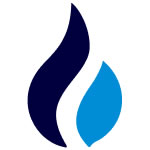1. Project Background and Introduction
Larry Fink, CEO of BlackRock, believes that tokenization is the future of finance and the next evolution of the market, and his stance may influence the attitudes of other major financial game players. As we highlighted in our previous research on Dusk Network, Real World Assets (RWA) are becoming an important asset class in the cryptocurrency industry. As of May 2024, the RWA market has exceeded $6.6 billion, reflecting investors growing interest in this innovative financial product. Tokenizing RWA and introducing it to the blockchain can provide yield opportunities in DeFi (decentralized finance). The asset tokenization market is expected to reach $10 trillion by 2030.
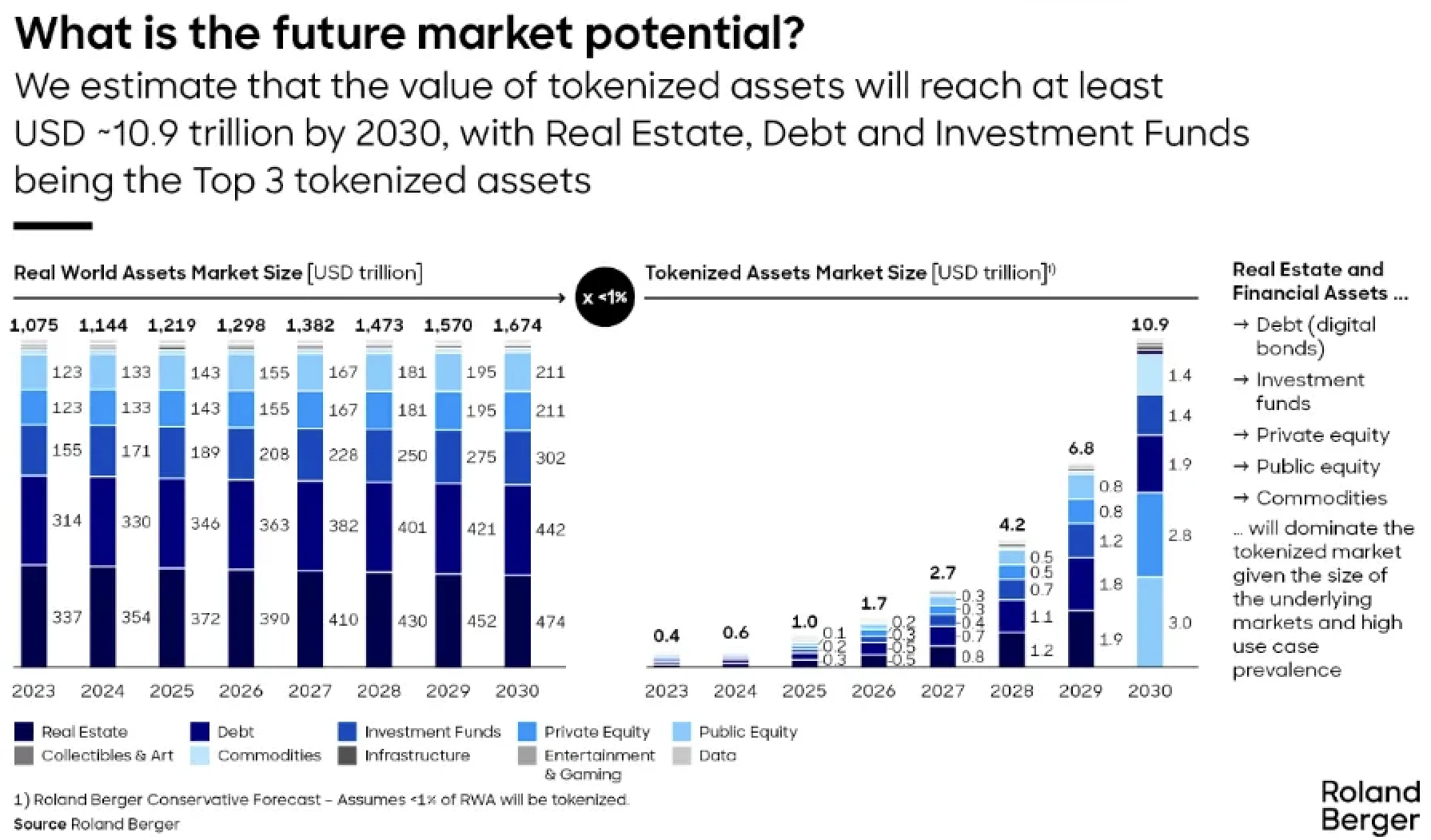
Source: Roland Berge
The main attraction of this emerging market is not just the yield opportunity for DeFi. By digitizing assets into tokens, it enables asset fragmentation - splitting assets such as government bonds, stocks and real estate into smaller shares. This process enhances liquidity and opens the door to investment opportunities for investors with different capital levels.
Chainlink explains how asset tokenization works with the illustration below. Its main benefits include increased liquidity and improved accessibility through interoperable tokenized assets, enabling small investors to invest in high-yield assets with relatively low capital. In addition, due to the public nature of many blockchains, it improves transparency and enhances composability by connecting the value of real-world assets into the DeFi ecosystem.

Source: Chainlink
The market value of tokenized U.S. government bonds has also grown from $114 million to $845 million in 2023, with Franklin Templeton being the largest issuer of this asset class, accounting for approximately 38% of the market. Recent research from EY shows that 64% of high net worth investors and 33% of institutional investors plan to increase their investments in tokenized treasuries by the end of 2024.  While still in its infancy, asset tokenization represents one of the most promising and potential applications of blockchain technology. Ondo Finance is well-positioned to capitalize on this trend with its Treasury tokenization service, and investor interest continues to grow.
While still in its infancy, asset tokenization represents one of the most promising and potential applications of blockchain technology. Ondo Finance is well-positioned to capitalize on this trend with its Treasury tokenization service, and investor interest continues to grow.
2. Technical Architecture
Ondo is transforming finance through its decentralized protocol, leveraging blockchain to deliver institutional-grade products. By tokenizing stable assets in traditional finance, Ondo combines the reliability of blockchain with the efficiency of blockchain. Ondo has two main divisions: Asset Management and Technology. The Asset Management division creates and oversees tokenized financial products, while the Technology division develops the protocols that support these products.
Currently, Ondo Finance offers two different investment options:
(1) USDY (Ondo US Dollar Yield Token)
Tokenized notes backed by short-term U.S. Treasuries and bank deposits.
It offers an annualized yield (APY) of 5.30% and a total value locked (TVL) of $315.35 million.
Safer and more transparent than traditional stablecoins (such as USDT/USDC).
Managed by Ankura Trust Company to ensure compliance and investor protection. 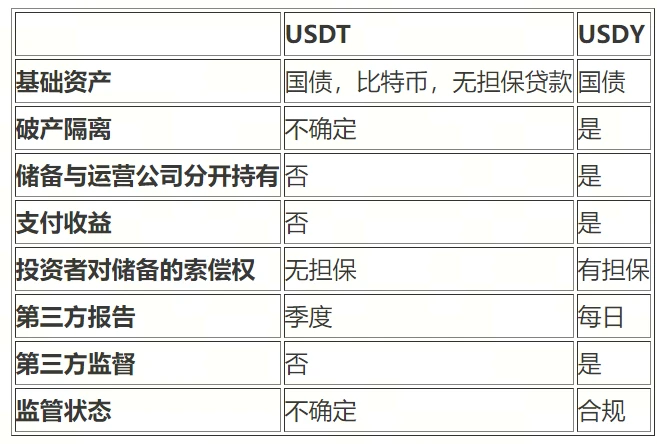
Source: Ondo Finance
(2) OUSG (Ondo Short-Term U.S. Treasury Bonds)
Providing low-risk tokenized short-term U.S. Treasury bonds to passive investors.
It offers an annualized yield (APY) of 4.81% and a total value locked (TVL) of $221.32 million.
Transfer of investment from BlackRock’s SHV to BUIDL in March 2024.
Ondo recently launched a new version of OUSG, called rOUSG, which provides investors with yields through additional rOUSG tokens.
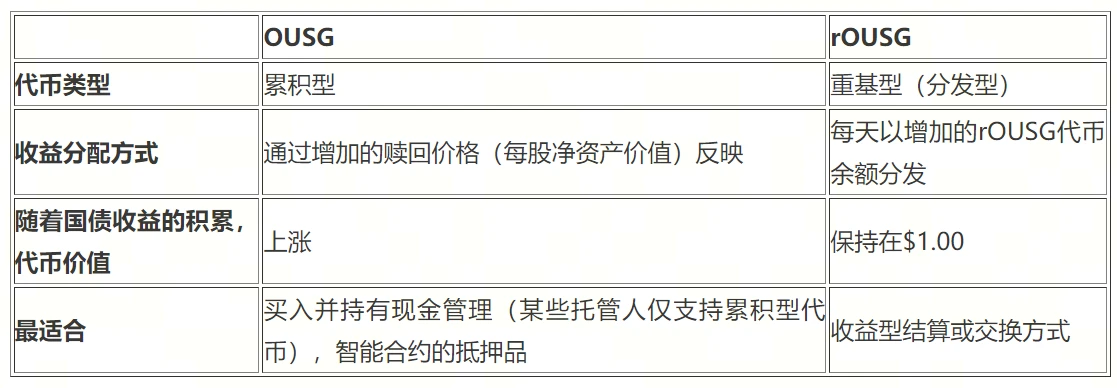
Source: Ondo Finance
3. Products and Development Roadmap
Ondo Finance aims to connect traditional finance and decentralized finance through public blockchain technology. Their focus is on creating secure, transparent and compliant financial products.
OUSG: Tokenized BlackRock Short-Term US Treasury Bond ETF.
OMMF: Tokenized BlackRock Money Market Fund.
USDY: An alternative to yield-bearing stablecoins.
Flux Finance: A protocol that supports tokenized securities as collateral.
In the next phase, they aim to tokenize publicly traded securities, addressing challenges related to liquidity and infrastructure. Ultimately, Ondo hopes to innovate in traditional finance by extending the benefits of blockchain to a wider range of financial services, using a combination of centralized and decentralized mechanisms. This approach will help bring the benefits of blockchain technology to a wider range of financial operations.
These products have driven significant growth, with Ondo’s TVL increasing from $40 million to $534 million. Moving forward, Ondo plans to expand the use of its tokenized cash equivalents by increasing the adoption and liquidity of USDY, OUSG, and OMMF. This will involve building partnerships and developing cross-chain tools to facilitate these processes.
Flux Finance, created by the Ondo Finance team, is an important advancement in decentralized lending. It is based on Compound V2, but adds new features. It supports open tokens such as USDC and restricted tokens such as OUSG (Ondo Short-Term US Government Bond Fund). This means that you can lend USDC freely, but borrowing using OUSG as collateral requires meeting specific licensing requirements to ensure compliance and security. Flux uses a peer-to-peer (p2p ool) model similar to Compound, allowing users to borrow and lend in an over-collateralized manner. Lenders can earn interest on the stablecoins they provide, while borrowers can borrow stablecoins using their collateral and follow the assets licensing requirements. Flux Finance is governed by the Ondo DAO.
4. Competitive Products
Ondo appears to be making its mark in traditional finance in the crypto RWA category, complementing other TradFi companies, given its relationships with giants like BlackRock. Competition is heating up in the decentralized finance space. Centrifuge focuses on tokenized structured credit and issues debt using NFTs. Ethena provides synthetic asset exposure, enabling users to trade without holding assets. Maple Finance provides low-collateralized loans to institutions, emphasizing credit assessment and lending. Pendle handles tokenized yield trading, enabling users to separate and trade the yield portion of an asset.
Ondo Finance stands out for several reasons. It targets the massive U.S. Treasury market by integrating traditional finance with blockchain, with broad market coverage. Its complementary approach involves partnering with traditional financial giants such as BlackRock, thereby avoiding direct competition. In addition, Ondo offers innovative products such as USDY and OUSG, providing a safer and more transparent alternative to traditional stablecoins.
5. Token Economy
(1) ONDO Token Economics Summary
Market Cap Ranking: #54
Fully Diluted Valuation (FDV): $131.5 B, Rank #16
Circulating Supply: 1.44 billion ONDO (14.27% of total supply)
Total supply: 10 billion ONDO
Maximum supply: 10 billion ONDO
Next unlock: 1.67 million ONDO (about $2.19 million), 5 days later
(2) Token Allocation
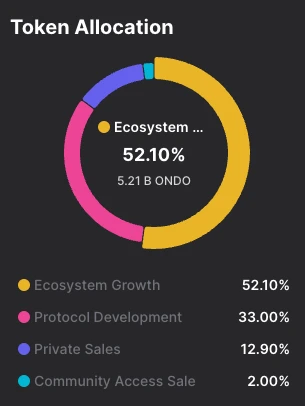
Source: Dropstab
(3) Event I will be unlocked soon
June 18, 2024: 1.67 million ONDO (about $2.19 million)
July 18, 2024: 1.67 million ONDO (about $2.19 million)
August 18, 2024: 1.67 million ONDO (about $2.19 million)
September 18, 2024: 1.67 million ONDO (about $2.19 million)
October 18, 2024: 1.67 million ONDO (about $2.19 million)
November 18, 2024: 1.67 million ONDO (about $2.19 million)
December 18, 2024: 1.67 million ONDO (about $2.19 million)
January 18, 2025: 1.94 billion ONDO (about $25.5 B)
January 18, 2026: 1.94 billion ONDO (about $25.5 B)
January 18, 2027: 1.94 billion ONDO (about $25.5 B)
January 18, 2028: 1.94 billion ONDO (about $25.5 B)
(4) Token usage
ONDO tokens are the governance tokens for Ondo Finance and its Flux Finance protocol. Holders are given the right to vote on various proposals within the Ondo DAO, ensuring that all decisions are made transparently on-chain. To initiate a proposal, an individual must hold or be delegated voting power of at least 100 million ONDO. It is not clear whether other uses will be introduced for ONDO holders in the future.
6. Team, Financing History, and Ecosystem
The Ondo Finance team has a diverse mix of people from traditional finance and Web3. Founder and CEO Nathan Allman and President and COO Justin Schmidt both come from Goldman Sachs. Another important member, Katie Wheeler, comes from BlackRock. In addition, the team also includes developers from OpenSea, MakerDAO, and Boson Protocol. This combination of expertise is highly consistent with Ondo Finances unique vision and goals.
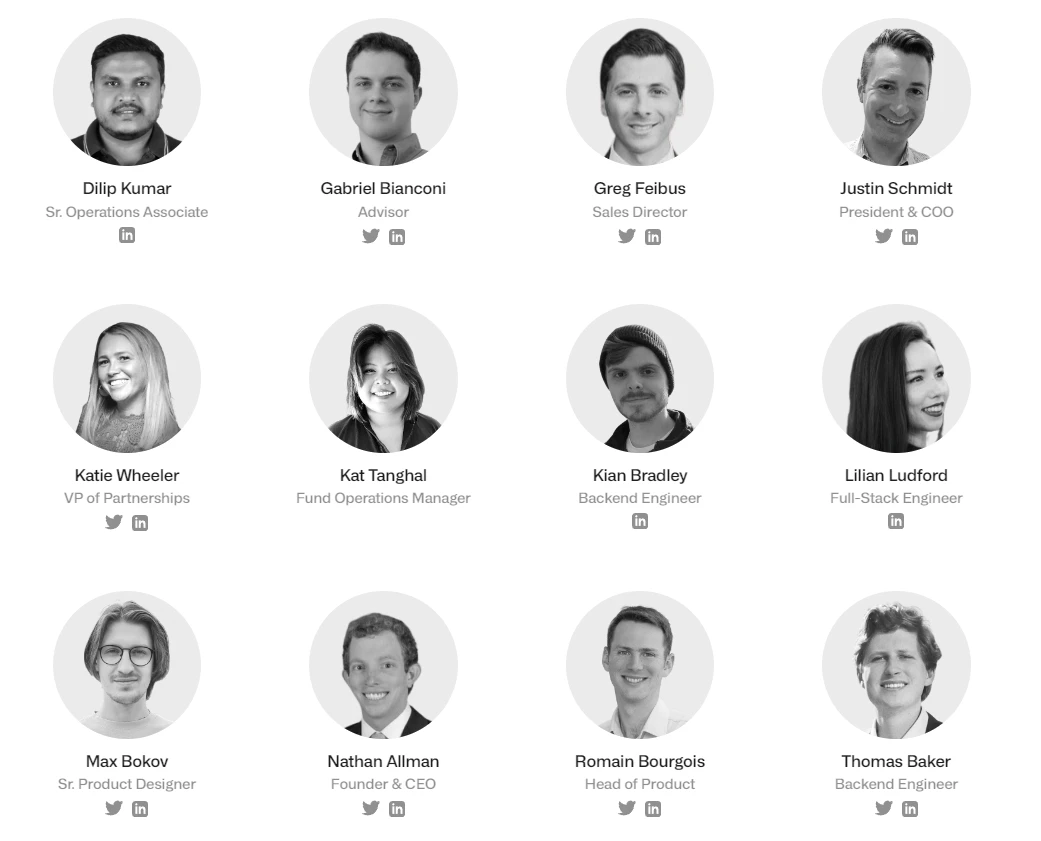
Source: Ondo Finance
Seed Round: In December 2021, Ondo Finance raised $4 million at $0.013 per token, achieving a 99.87x return on investment (ROI). A total of 300 million tokens (3% of the total supply) were sold, led by Pantera Capital, with an initial lock-up period of 1 year, followed by a 24-month release period.
Public offering: On May 12, 2022, $10 million was raised at $0.03 per token, achieving a 43.28x return on investment (ROI). A total of 100 million tokens (1% of the total supply) were sold on Coinlist, with a 1-year lockup period followed by an 18-month release period.
Series A: In April 2022, $20 million was raised at $0.02 per token, achieving a 64.92x return on investment (ROI). A total of 1 billion tokens (10% of the total supply) were sold, led by Founders Fund, with an initial lock-up period of 1 year, followed by a 24-month release period.
Ondo Finance has formed several key partnerships to strengthen its blockchain and financial services:
Aptos Foundation: This collaboration will show the integration of world assets with blockchain technology, starting with the tokenized U.S. Treasury product USDY.
Thala Labs: Collaborate to launch USDY for use in Thala’s AMM pool and use it as collateral for collateralized debt positions (CDPs), enhancing liquidity and DeFi solutions.
Wintermute: Collaboration to increase liquidity of USDY, the US dollar yield stablecoin, providing 24/7 liquidity across multiple blockchain platforms.
BlackRock: Demonstrated commitment to expanding tokenization efforts and integration with Ondo products through a $95 million investment in BlackRock’s BUIDL fund.
VII. Conclusion
Ondo Finance stands out for several reasons. It targets the massive U.S. Treasury market by integrating traditional finance with blockchain, with broad market coverage. Its complementary approach involves partnering with traditional financial giants such as BlackRock, thereby avoiding direct competition. In addition, Ondo offers innovative products such as USDY and OUSG, providing a safer and more transparent alternative to traditional stablecoins.
Positive factors:
The tokenization industry is set to see significant growth, and Ondo Finance’s partnership with BlackRock is strategically positioned to bring trillions of dollars into Web3.
Ondo Finance’s TVL has seen substantial growth since the beginning of 2024. Real-world assets represent a fresh and promising narrative in the crypto space, with strong early adoption potential.
Ondo Finance is committed to evolving its products to meet customer needs.
Most of OUSG’s investments were initially in BlackRock’s iShares Short Treasury Bond ETF (SHV). In March 2024, they moved to BlackRock’s USD Institutional Digital Liquidity Fund (BUIDL), in line with Ondo’s focus on tokenizing assets.
Ondo Finance, a leader in the crypto RWA space, emerged as the top choice.
Ondo Finance holds approximately 38% of the current supply of BUIDL.
Negative factors:
The use cases for ONDO tokens present significant centralization risks.
While all holders can participate in governance, the largest holders have the most influence.
Approximately 85% of the total ONDO supply is controlled by the Ondo Finance team.
Operating at the intersection of TradFi and cryptocurrencies, Ondo Finance enters a relatively untapped market where regulation poses significant challenges.
Bad debt is a major risk for DeFi protocols including Ondo Finance’s Flux. Bad debt occurs when a borrower’s collateral is worth less than their debt. If a borrower’s equity goes negative, Flux will use its reserves to mitigate losses. To minimize volatility and reduce bad debt risk, Flux only accepts stable assets as collateral.

